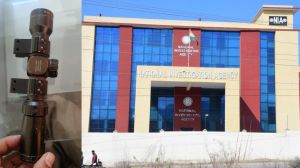Can ‘blood money’ save Nimisha Priya from being executed in Yemen?
Nimisha Priya, a nurse from Kerala, was sentenced to death for murdering a Yemeni citizen. Her execution will happen on July 16.
 Nimisha Priya, who hails from Palakkad, Kerala, was found guilty of murdering Talal Abdo Mahdi in 2017. She was apprehended while trying to flee Yemen and sentenced to death in 2018. (File photo)
Nimisha Priya, who hails from Palakkad, Kerala, was found guilty of murdering Talal Abdo Mahdi in 2017. She was apprehended while trying to flee Yemen and sentenced to death in 2018. (File photo)Convicted for the murder of a Yemeni citizen, Indian nurse Nimisha Priya is set to be executed on July 16 even as efforts remain ongoing to save her from the gallows.
“Options are still open. The Government of India can intervene in the matter to save her life,” said Samuel J Baskaran, a social worker leading negotiations with Yemeni officials and the family of the deceased. Government intervention, however, is significantly complicated by India not having official relations with the Houthis, the outfit that has been in power in Sana’a since 2014.
What is more likely to come through are negotiations with the family of the deceased, and the offer of “blood money”. “We had made an offer to the family during the last meeting. So far, they have not responded. I am leaving for Yemen today to resume the negotiations,” Baskaran said Tuesday.
Diyya in Islamic law
According to Islamic law, victims of crimes have a say in how criminals are to be punished. In case of murder, this principle applies to the families of victims. Although murder is punished via the death penalty, the victim’s family (specifically, heirs) may choose to “forgive” the murderer in exchange for monetary compensation.
This is the principle of diyya, commonly referred to as “blood money”. It can be traced to the Holy Quran.
“O believers! The law of retaliation is set for you in cases of murder — a free man for a free man, a slave for a slave, and a female for a female. But if the offender is pardoned by the victim’s guardian, then ‘blood money’ should be decided fairly and payment should be made courteously. This is a concession and a mercy from your Lord.” [2:178]
Scholars believe that the idea behind this is to encourage the virtue of forgiveness, while also providing reparative justice to the family of a victim.
The scriptures do not set any specific amount as compensation, with the sum generally arrived at via negotiation between the murderer’s family/representatives and the victim’s family. Some Islamic countries, however, have set minimum compensation amounts.
According to a report by The News Minute, the Save Nimisha Priya Action Council has offered to pay a sum of $1 million (roughly 8.5 crore) to the family of the deceased. However, it is yet to receive a response from the family.
The Nimisha Priya case
Nimisha Priya, who hails from Palakkad, Kerala, was found guilty of murdering Talal Abdo Mahdi in 2017. She was apprehended while trying to flee Yemen and sentenced to death in 2018.
After becoming a qualified nurse, Priya moved to Yemen in 2008. In 2011, she married Tomy Thomas in Kerala, with whom she returned to Yemen. She worked as a nurse, while he worked as an electrician. Both, however, dreamt of starting their own clinic. But as per Yemeni law, this required them to partner with a local.
This is where Mahdi entered the picture. A regular at the clinic where Priya worked as a nurse, the couple approached Mahdi for help. Mahdi even came to Kerala in 2015 to attend the baptism of Priya’s daughter. While Priya returned to Yemen, the civil war prevented her husband and daughter from following her. They remain in Kerala today.
In Yemen, Mahdi decided to take advantage of Priya. He opened a new clinic but refused to share his income with her. He also allegedly forged documents to show her as his wife. According to Priya’s family, what followed was a cycle of physical and sexual abuse. Priya was unable to leave because Mahdi had taken all her travel documents and passports. He also did not allow her to speak to her family in Kerala.
One fine day, Priya, with the help of fellow nurse Hannan, tried to allegedly sedate Mahdi, in order to obtain her papers. But an overdose led to his death. Panicking, the duo decided to chop Mahdi’s body up, and dump it in a water tank. Both were eventually arrested.
This is an edited version of an article that was earlier published in 2024.
- 0121 hours ago
- 0221 hours ago
- 0320 hours ago
- 0421 hours ago
- 0521 hours ago






































